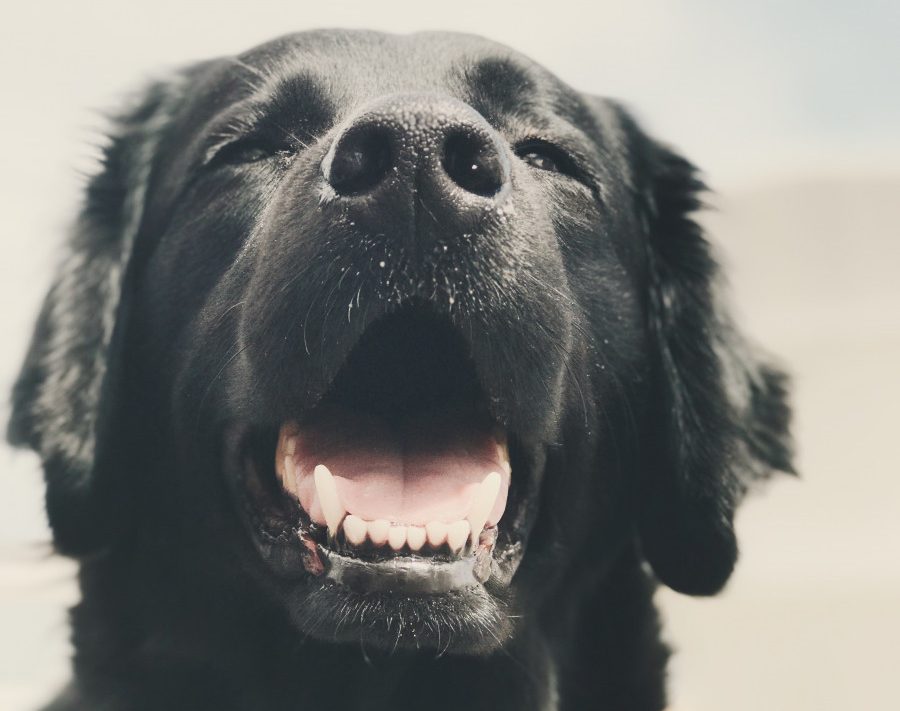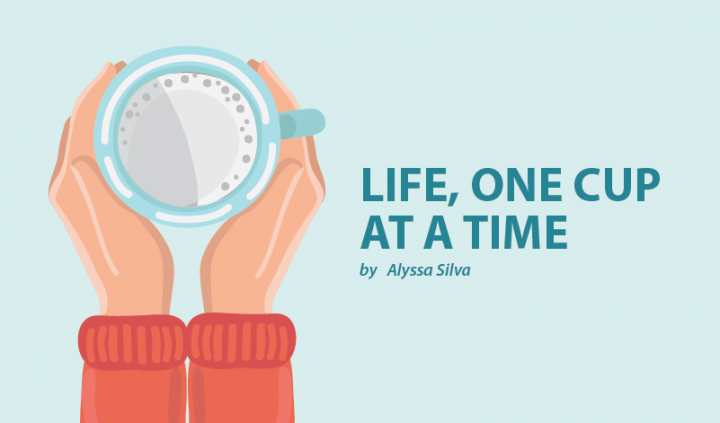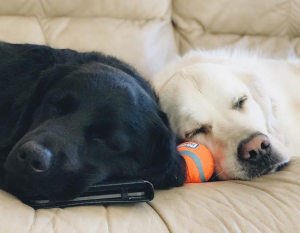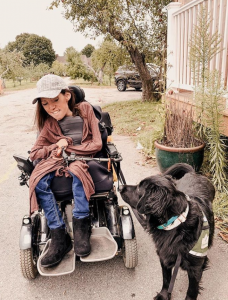How My Service Dog Helps Break Social Barriers
Written by |

(Courtesy of Alyssa Silva)
For those of you who don’t follow me on Instagram and see my absurd collection of pictures of my dogs, I have two retrievers named Wish and Vince. Vince, or Vince Charming as he’s affectionately called, is an English cream golden retriever and the family dog. Wish, on the other hand, is a mix between a black Labrador and golden retriever and is my service dog. While I love to gush about my two cuddle bugs equally — yes, I’m one of those annoying dog moms — I’ll focus today on my girl, Wish, and detail our shared bond.
Service dogs are a tremendous asset to anyone who is living with a disability and, of course, loves pets. Dogs are brilliant animals. Not only are they intelligent and willing to learn, but they are also empathetic. I’m not sure this is scientific fact, but every dog I’ve had in my lifetime (service dog or not) has been hyper-aware of emotions that run in my house. It’s incredible how keen they are to a person’s energy, and more often than not, it is from my dogs that I seek comfort.
Wish is no different. In September 2015, my parents and I flew down to an eight-day training program, and that was where I met my girl. She came from a farm down in Milton, Georgia, which is the home of a nonprofit organization called Canine Assistants. Being my second service dog from this organization, I knew I would be in great hands with the trainers and paired with a dog that would best suit my needs. I wasn’t wrong. Wish was already named when I got her, but because it was right around my birthday, I always tell people she’s a candle-blowing Wish come true.
Aside from what a service dog’s title suggests on paper (knowing different commands to help their human, providing comfort when needed, sensing oncoming seizures or diabetic highs and lows, etc.), Wish has brought another service to the table, something I had never expected and never knew I needed all along. Wish has helped break down social barriers whenever we go out in public and continues to do so to this day.
Ask questions and share your knowledge of SMA in our forums.
I don’t mean to brag or anything, but Wish is quite the cutie and an object of attention wherever we go. So, whenever we are approached by a passerby admiring her sweet, southern charm, I encourage them to say hello and give her a good rub. Fortunately, the organization she came from allows their service dogs to receive attention from others while working.
I’m a big fan of this idea. Without intentionally trying, this kind of interaction fostered by Wish encourages more acceptance of me due to the conversations with the people we encounter. After all, instead of people staring at me for the wrong reasons, they stare at my dog for the right reasons. Instead of people making judgments as they pass by, they make small talk to learn about Wish and me. Instead of being “just some girl in a wheelchair,” I am an actual human being with thoughts and feelings who is happy to talk to you.
I’m not saying service dogs are the answer to the problematic stigmas that exist for people with disabilities, but I do believe they can facilitate in lessening the detrimental impact these stigmas have on one’s emotional well-being. It is because of Wish that I have plentiful opportunities to meet new people and engage in more conversations I may not have had without her by my side. Aside from taking on the role of a service dog, I think it’s safe to say she’s also my partner in crime wherever we go.
***
Note: SMA News Today is strictly a news and information website about the disease. It does not provide medical advice, diagnosis, or treatment. This content is not intended to be a substitute for professional medical advice, diagnosis, or treatment. Always seek the advice of your physician or other qualified health provider with any questions you may have regarding a medical condition. Never disregard professional medical advice or delay in seeking it because of something you have read on this website. The opinions expressed in this column are not those of SMA News Today, or its parent company, Bionews Services, and are intended to spark discussion about issues pertaining to spinal muscular atrophy.







Peter Greene
Thank you for this, Alyssa. I too have a service dog. I have taught my dog the release command of "visit" which he understands well. All too often people ask to pet my dog. As annoying as that can be at times, if I am in a situation where my dog doesn't need to be laser focused on me, I will tell him to visit and he will move towards that person and greet them. All the time he continually glances back at me and if I utter a command he is on it right away.
I have to agree with you that this definitely crosses those pesky social barriers. Sometimes people want to know about his job or training and I'm always quick to talk about that. Someties it leads to just plain old human conversation that otherwise I might have avoided if my dog hadn't opened things up to begin with. When people show respect to my dog that really transfers to me. Sometimes I feel a little awkward in public with my dog. I'm sure your familiar with the stares and people talking about you and/or the dog often not realizing or caring that you can clearly hear what they are talking about. When someone talks to my dog and then me it helps calm that sense of awkwardness.
A lot of service dog trainers say it isn't good to let me dog visit like that but they can't give me any good reason for that position. I clearly see it as a reward for my dog. Like most any other dog, he enjoys socializing and definitely enjoys a little scratch behind the ears from a well intentioned dog lover now and again.
I always make it a point to introduce my dog whenever I am getting into a situation where I will be with people for a while such as getting on an airplane or going to a basketball game and it really helps. Its also something the damn fakers won't so as they are trying to have their do go unnoticed.
Thanks again for putting this out there!
Sharon
Im mentally and physically disabled I developed a condition that makes it hard for me to acknowledge and speak to others I've always had a dog im now living alone and I love animals so much i know we could work together he would make me feel safe and give me company